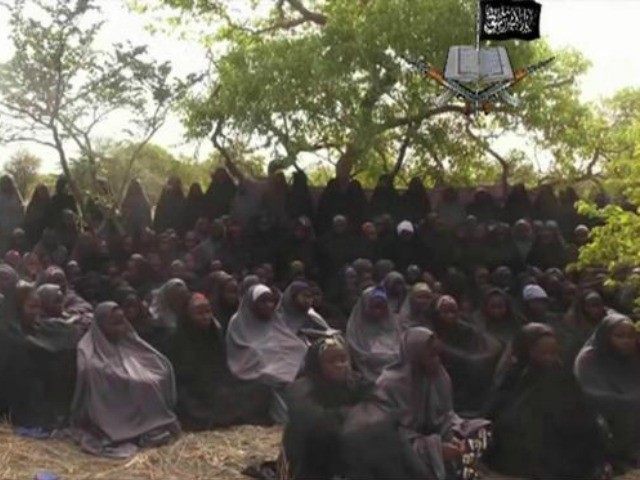A girl found with bombs strapped to her body who claimed to be one of the nearly 300 girls kidnapped by Boko Haram from Chibok, Nigeria, two years ago was lying, law enforcement officials have confirmed.
The girl, estimated to be between nine and twelve years old, was arrested with an accomplice, a woman believed to be in her thirties, in Cameron last week. Upon being detained, the girl told authorities she was from Chibok, Borno state, and had been kidnapped in the April 2014 raid that made the Islamic State-affiliated terror group a household name.
The Nigerian government had arranged to send two parents of the missing girls in Chibok to Cameroon to meet the girl and positively identify her. Officials preempted the trip, however, with a confirmation that the girl was lying. The Associated Press notes, however, that she is from a neighboring village in Nigeria near Bama, Borno state.
Nigeria’s The Nation newspaper is identifying the girl as Aissatou Musa, “the daughter of Musa Bladi and Fanta (mother) of Mandara ethnic group.” The older would-be suicide bomber has been identified as “Mamma Sali. She is the daughter of Sali Chetima and Hajiya Bintou of Kanuri tribe,” according a law enforcement report cited by The Nation.
The two are nonetheless believed to be victims of Boko Haram, as the group has increased the frequency with which it relies on female suicide bombers to engage in attacks in recent months. Women and girls can more easily hide explosives under their Islamic clothing and loiter outside of targets like mosques without being suspected of wrongdoing. This has not prevented fear of Boko Haram from triggering attacks on innocents, however; at least one mentally ill woman has been killed by a mob in northeast Nigeria who suspected her eccentric behavior was a sign she was planning a suicide bombing.
Both suspects in the Cameroon case are currently receiving treatment at a clinic. The younger girl identified as Musa was found “heavily drugged” and significantly injured in a manner that suggested physical abuse. Authorities have released less information regarding the older suspect. Authorities note that the girl claiming to have been one of the students kidnapped in Chibok showed no signs of having ever been educated in a Western-style school, though she had received “Koranic training.”
The girls kidnapped from Chibok were completing an end-of-term physics exam when they were abducted, and most were in their mid-to-late teens. The attack occurred on April 14, 2014, and only those who escaped in the immediate aftermath of the abduction, jumping off moving trucks, have been seen since. A month after the abduction, Boko Haram released a video showing the girls wearing Islamic garb and reciting Koranic verses.
Rumors of the fate of the girls continue to circulate to this day. Some evidence suggests most were married to Boko Haram jihadis, while others speculate that they may have been trained as suicide bombers. Captives taken in other raids who have since been liberated showed signs of indoctrination, and many were pregnant or had children while held hostage. A recent report indicated that Western intelligence knew of their whereabouts months after the kidnapping, but authorities could not come up with a plan to save them that would not directly endanger their lives.
Boko Haram has reporrted killed an estimated 20,000 people since its founding, though it has become significantly more active since pledging allegiance to Islamic State Caliph Abu Bakr al-Baghdadi last year. The government of Borno, the Nigerian state most directly affected by the terror organization, issued a report this week estimating that the group has destroyed one million homes in terror raids, displacing more than two million people.

COMMENTS
Please let us know if you're having issues with commenting.